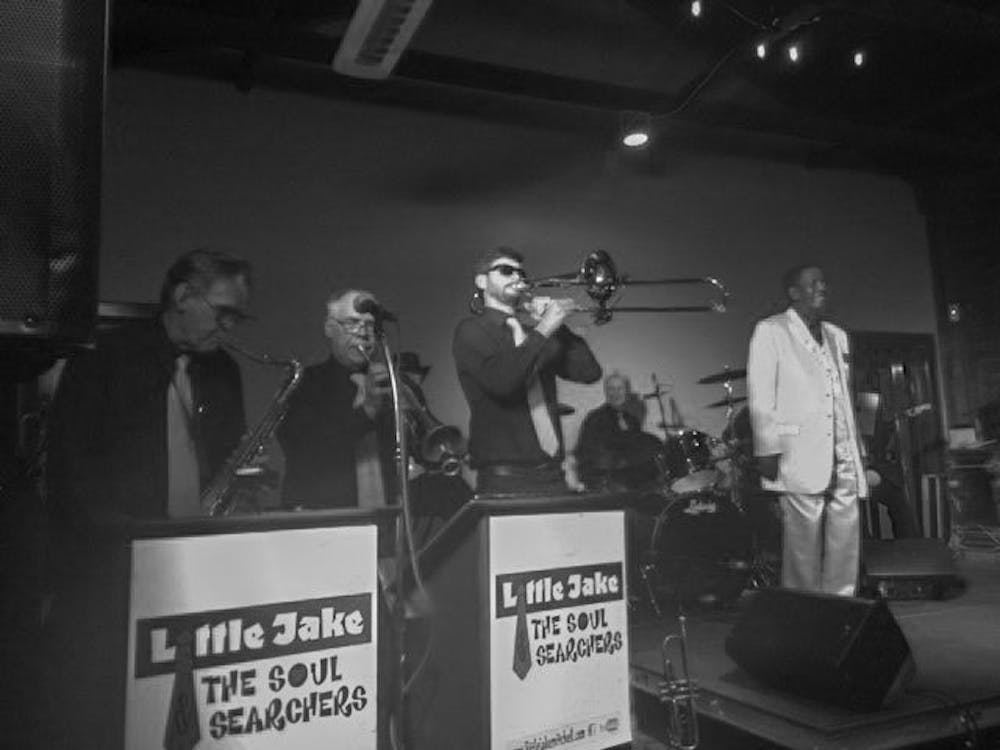Seven years ago, John Capouya discovered a great deal of his favorite soul artists came from Florida.
Capouya, a journalism and writing associate professor at the University of Tampa and a teacher of creative nonfiction in its MFA Program, held a presentation and book signing at the Matheson History Museum on East University Avenue Friday evening. The book is titled “Florida Soul: From Ray Charles to KC and the Sunshine Band.”
To a packed room of about 40, he gave details on his journey and discoveries in Florida. By playing memorable songs from various soul artists, he managed to captivate the audience and create interaction among everyone.
“This is a soul music capital that deserves to be recognized,” Capouya said. “I try to make that case in this book.”
From Ray Charles to KC and the Sunshine Band, he dug up as much information as he possibly could about Florida’s soul history. He uncovered that the origin of “The Twist” resides in Tampa, and found Bobby Purify of James & Bobby Purify was not actually named that. There were two Bobbys, both with different names who took on the mantle of Bobby Purify.
Capouya also discovered Florida was a hotspot for talent between the 1940s and 1980s because of three things: Florida Agricultural and Mechanical University’s Marching 100, the Chitlin’ Circuit and Latin influences.
He noticed a majority of the artists in his book were alumni of FAMU’s Marching 100, one of the most prestigious and rigorous band programs in the nation. Artists such as Willie Clarke developed their sound and techniques at FAMU.
Florida was the most urban state after World War II, and this led to the establishment of numerous nightclubs and venues for both white and black audiences. The amount of venues gave black musicians the chance to tour across the state for months and make steady money.
This strip of venues was known as the Chitlin’ Circuit, and Florida boasted the largest strip of venues aside from Texas. One venue at the time was the Two Spot in Jacksonville, which could hold up to 2,000 people.
Latin influences also played an important role in Florida soul by adding interesting counts and rhythms to an already diverse genre. Willie Hale, also known as Little Beaver, played his guitar with the inspired Latin rhythms he learned in Miami.
On the 1971 Betty Wright song “Clean Up Woman,” Hale played a chorded guitar riff that was reminiscent of the five-beat clave pattern that can be found in salsa, conga and other Latin genres.
These factors that helped establish the level of talent in Florida also helped to keep Florida soul out of the limelight. Unlike cities and record labels that had a distinct sound such as Motown in Detroit or Stax Records in Memphis, Florida soul did not have a distinct sound.
Floridian artists also found their success outside the state. Ray Charles and Sam & Dave both had greatest successes outside of Florida, but they never forgot their training and Florida heritage.
“It’s to our advantage as listeners but to our disadvantage that no one could pinpoint one city sound,” Capouya said.
After the presentation and signing Friday, a show was held at the Boxcar in Depot Park on Saturday night to commemorate Capouya’s book and Florida soul. Little Jake & the Soul Searchers performed.
Little Jake Mitchell, a lasting pillar in the soul community, has been performing since the 1950s; his first record came out in 1957. Mitchell’s band The Blenders was the first African-American group to perform at the University of Florida’s football homecoming Gator Growl event in 1960 to an integrated crowd.
“The only way we would be able to play is if our people could come,” Mitchell said. “For two straight years after, we sold out every show at every sorority and fraternity house.”
The performance at the Boxcar was electrifying, as the friendly environment led everyone to sing and dance to the sounds coming from the Soul Searchers.
Everyone was moving and ignoring the hot air that kept getting warmer. Mitchell puts everything in his performances, and nothing demonstrated that better than the thick beads of sweat dripping from his forehead.
For Capouya, Mitchell represents the enduring legacy of soul music into the 21st century. There are some who still perform soul music today, and there are others who are heavily influenced by the soul artists of the past.
Toronto-rapper Drake sampled Timmy Thomas’ 1972 “Why Can’t We Live Together” in his song “Hotline Bling” from his 2016 studio album “Views.” Chance The Rapper’s “Favorite Song,” from his 2013 mixtape “Acid Rap,” samples Betty Wright’s “Clean Up Woman.”
Soul is alive in countless ways, and in the state of Florida it does not seem to be slowing down anytime soon.
“Soul is the beginning of lots of music, and I think it is an honor that someone decided to publish a book on its history in Florida,” Mitchell said.
“Florida Soul: From Ray Charles to KC and the Sunshine Band” can be purchased at online retailers such as amazon.com and barnesandnoble.com.
Little Jake & the Soul Searches performed at the Boxcar in Depot Park after the presentation and signing.





